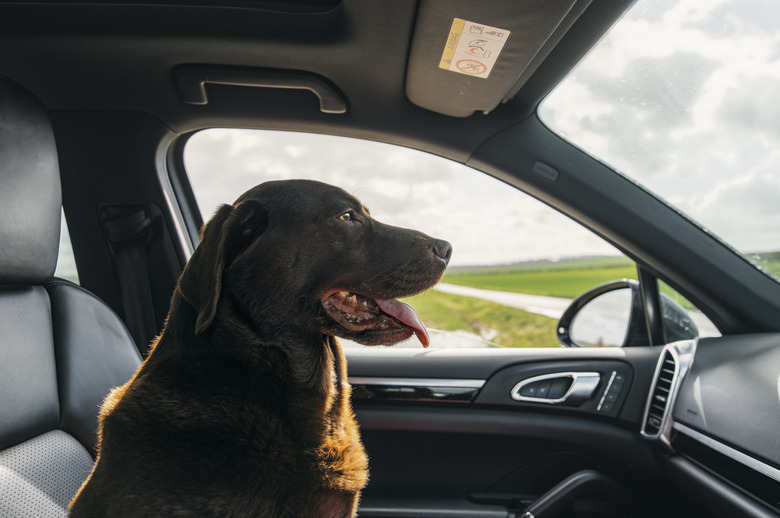Brain Injury In Dogs: Symptoms, Causes, And Treatment
Traumatic brain injury (TBI) in dogs is a serious medical emergency with potentially life-altering ramifications. There are a number of possible causes and symptoms of brain injury. Head trauma patients will be treated based on the cause, severity of the primary brain injury, and presence of secondary brain injuries.
What is a brain injury?
What is a brain injury?
Primary brain injuries in dogs are the result of head trauma, such as a forceful blow to the head due to an incident like a car accident or fall. Brain damage or injury can also result from metabolic dysfunction, brain disease, or inflammation. The initial, or primary, injury can lead to secondary brain injuries, which could be bleeding or intracranial pressure or swelling (edema).
Signs of brain injury in dogs
Signs of brain injury in dogs
Indications that your dog has suffered brain trauma or injury include:
- Seizures
- Rapid breathing
- Blue-colored skin, tongue, or gums due to
poorly oxygenated blood - Altered level of consciousness or behavior abnormalities, like pacing or circling
- Bleeding from the eyes, nose, or ears
- Changes in body temperature
- Decreased heart rate
- Lethargy
- Pupils that are uneven in size or don't
respond to light
What causes brain injuries in dogs?
What causes brain injuries in dogs?
Outside of direct forceful head trauma, which might occur if a dog is hit by a car, there are a variety of other causes of brain injury and brain hemorrhage in dogs. Possible causes are:
- Tumors, parasites, and some infections
- Significantly low or high blood pressure
- Lack of blood flow to the brain (ischemia)
- Hypoglycemia (low blood sugar)
- Severe or long-lasting fever
- Severe or multiple seizures
- Ingestion of toxic substances
- Severe decrease in body temperature
- Blood clots
- Cardiac or respiratory arrest
- Low blood oxygen, which is called hypoxia
Treatment for a dog’s brain injury
Treatment for a dog's brain injury
Treatment for a dog's brain injury will depend on the cause. Some dogs might need hospitalized care, pain relievers, heavy sedation, a temporary state of general anesthesia, or surgery. Small animal veterinary medicine specialty hospitals that have a neurology department offer a level of care for pets that is similar to human medicine. Your veterinarian (DVM) or a veterinary neurology specialist will likely recommend a CT (computed tomography), which is a series of X-rays (radiographs). CT scans look for things like blood clots, brain bleeding, brain bruising (contusion), and brain tissue swelling. But it's also possible at some point — such as if your dog isn't improving — that they will also need an MRI (magnetic resonance imaging).
The first steps are to stabilize breathing and heart function. To increase oxygen levels in the brain, a breathing tube in the windpipe may be necessary. Low or high blood pressure will need to be regulated. If there is high pressure inside the skull for some other reason, medication can be used to decrease intracranial pressure. If there is intracranial pressure, the dog's head should never be lower than their body.
Intravenous fluid therapy may be necessary if there's bleeding, but this should be administered with care to avoid fluid buildup in the brain. Depending on blood glucose levels, intravenous glucose may be needed. If the dog is not blinking normally, eye lubrication can alleviate dry eyes. To support healing, a feeding tube may be required to ensure healthy nutrition. If the dog is unable to position themself to urinate or defecate, they may need assistance or monitoring.
Surgery may be necessary if there is a skull fracture, a foreign object penetrating the skull, or a buildup of fluid or blood inside the skull. Dogs with permanent side effects may need ongoing medications or special care.
Can dogs heal from brain damage?
Can dogs heal from brain damage?
Yes, dogs can heal from brain trauma, especially if they're young and the primary injury is minor. Any dog who has sustained a brain injury will need to be monitored during recovery. During the first 48 hours, if the dog experiences no additional nervous system deterioration and if blood pressure, mineral levels, and blood glucose remain normal, it is a good indicator of a positive outcome.
However, long-term complications of brain trauma or hemorrhage are possible, and the dog may require medications or ongoing treatment. It may take six months or longer to determine whether a dog will fully recover from a brain injury.
The following are potential long-term issues in head trauma patients:
-
Dry eyes if blinking dysfunction
continues - Ongoing
seizures - Swelling
of the brain - Bleeding
into the skull - Difficulty
eating, resulting in malnourishment - Permanent
brain damage
What is the difference between a concussion and a brain injury?
What is the difference between a concussion and a brain injury?
Concussions are one type of head injury, when the brain bounces within the skull. Concussions are a result of a blow to the head, which can occur from a fall, a car accident, being hit with a blunt object, or a head butt or kick from another animal. If you suspect your dog might have a concussion, seek veterinary care immediately. A neurological examination will determine the severity and the appropriate treatment plan.
The bottom line
The bottom line
Traumatic brain injuries in dogs can be fatal. Consult your veterinarian immediately if your dog spontaneously loses consciousness; bleeds from the ears, nostrils, or eyeballs; or exhibits unusual posture or behavior. While long-term complications are possible as a result of severe brain injury, with immediate and thorough veterinary treatment, dogs can make a full recovery.




